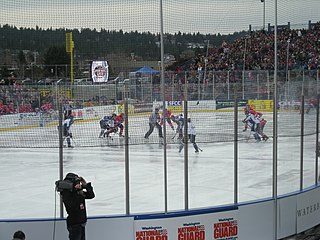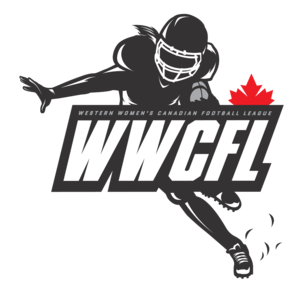
The Canadian Junior Football League (CJFL) is a national Major Junior Canadian football league consisting of 19 teams playing in five provinces across Canada. The teams compete annually for the Canadian Bowl. Many CJFL players move on to professional football careers in the Canadian Football League (CFL) and elsewhere.
The Western Canada Senior Hockey League was a senior ice hockey league that played six seasons in Alberta and Saskatchewan, from 1945 to 1951. The league produced the 1946 Allan Cup and the 1948 Allan Cup champions, and merged into the Pacific Coast Hockey League for the 1951–52 season.

The Saskatchewan Junior Hockey League is a Junior 'A' ice hockey league operating in the Canadian province of Saskatchewan and one of nine member leagues of the Canadian Junior Hockey League.
The Canadian Mixed Curling Championship is the national curling championship for mixed curling in Canada. The winners of the tournament represent Canada at the World Mixed Curling Championship.

This is a timeline of events throughout the history of the Western Hockey League (WHL), which dates back to its founding in 1966. The league was founded by a group of team owners and managers in Saskatchewan and Alberta, including Bill Hunter, Scotty Munro, Del Wilson, and Jim Piggott, who thought a larger western league would help western teams compete for the Memorial Cup against teams from the larger associations in Ontario and Quebec. Since the league's founding, it has expanded to include 22 teams across the four Western Canadian provinces along with the Northwest United States, and it has produced 19 Memorial Cup championship teams.

The Saskatoon Hilltops are a junior Canadian football team based in Saskatoon, Saskatchewan. The Hilltops play in the six-team Prairie Football Conference, which is part of the Canadian Junior Football League (CJFL) and compete annually for the Canadian Bowl. The team was founded in 1921 as a senior team in the Saskatchewan Rugby Football Union, which it played in until 1936. Two years after WWII the team reorganized in 1947. Beginning in 1953, the Hilltops have won 23 Canadian Bowl championships. The Hilltops won six consecutive Canadian Bowls between 2014 and 2019.

Sports in Saskatchewan consist of a wide variety of team and individual games, and include summer, winter, indoor, and outdoor games. Saskatchewan's cold winter climate has ensured the popularity of sports including its official sport, curling, as well as ice hockey, ice skating, and cross-country skiing. The province also has warm summers and popular summer sports include baseball, football, soccer, basketball, track and field, rodeo, horse-racing, and golf.

The Viterra Prairie Pinnacle, formerly the Saskatchewan Scotties Tournament of Hearts is the annual provincial women's curling championship for the Canadian province of Saskatchewan. The winning team represents Saskatchewan at the Scotties Tournament of Hearts, the national women's championship. The bonspiel is organized by CURLSASK, the provincial curling association.

The Western Women's Canadian Football League (WWCFL) is a full-contact women's Canadian football league which began play in the spring of 2011. The league plays an annual season in the spring and summer, and with seven teams it is the largest women's football league in Canada. The teams play 12-woman tackle football games using the Football Canada rules, similar to those of the Canadian Football League. The league has teams in Manitoba, Saskatchewan, and Alberta.
The Calgary Rage are a women's football team in the Western Women's Canadian Football League's (WWCFL) Western Conference. They are based in Calgary, Alberta.
Julie Paetsch is an athlete from Lanigan, Saskatchewan. Currently, she is a two-sport athlete in hockey and football. Selected by the Calgary Inferno in the 2013 CWHL Draft, she is also a competitor for the Saskatoon Valkyries of the Western Women's Canadian Football League.

The Saskatoon Valkyries are a women's football team in the Western Women's Canadian Football League's (WWCFL) Prairie Conference. The team is based in Saskatoon, Saskatchewan. They are the most successful WWCFL team, winning nine of the leagues twelve championships since play began in 2011, including the first four. Their primary rivals are the Regina Riot, the only other WWCFL team to win the championship.

The Regina Riot are a women's football team in the Western Women's Canadian Football League's (WWCFL) Prairie Conference. The team is based in Regina, Saskatchewan. Their provincial rivals are the Saskatoon Valkyries. The Riot and Valkyries have dominated the WWCFL since play began in 2011 as the only two teams to win the league championship.

The Lethbridge Steel is a women's football team in the Western Women's Canadian Football League's (WWCFL) Western Conference. The team is based in Lethbridge, Alberta.

The Manitoba Fearless are a women's football team in the Western Women's Canadian Football League's (WWCFL) Prairie Conference. The team is based in Winnipeg, Manitoba, and is the longest running Winnipeg-based women's tackle football team, founded in 2008. Their local WWCFL rivals were the Winnipeg Wolfpack. 'As of 2024, the Fearless are the only sanctioned Women in Manitoba.

The Edmonton Storm are a women's football team in the Western Women's Canadian Football League's (WWCFL) Western Conference. The team is based in Edmonton, Alberta. The Storm are Alberta's oldest competitive women's tackle football club.
Kathie Allardyce is a Canadian curler from Winnipeg, Manitoba. She is a two-time provincial women's champion.

Frederick Everett Betts was a Canadian ice hockey administrator and businessman. He concurrently served as president of the Canadian Amateur Hockey Association (CAHA), the Saskatchewan Amateur Hockey Association, and the Saskatchewan branch of the Amateur Athletic Union of Canada during the 1919–20 season. He sought regulations to govern amateur sport in Canada, which he felt was in a state of disrepute due to the lack of discussion and meetings during World War I. He supported the reinstatement of former professionals as amateur athletes as favoured in Western Canada, despite the growing rift with delegates from Eastern Canada on the issue. He sought for the Allan Cup trustees to allow the CAHA to have more say into how the national playoffs were operated and argued for receiving an annual percentage of profits from gate receipts to allow the CAHA to govern effectively.

Dave Dryburgh was a Scotland-born Canadian sports journalist. A native of Kirkcaldy and an immigrant to Regina, he reported on the soccer games in which he played for The Leader-Post. As the newspaper's sports editor from 1932 to 1948, he primarily covered Canadian football and the Regina Roughriders, and ice hockey in Western Canada. His columns "Sport Byways" and "Dryburgh" give a first-hand account of sporting events, and were read widely in Western Canada. As the secretary of the Saskatchewan Amateur Hockey Association during the 1930s and 1940s, he established its registration system including the history of each player. He also served as the official statistician for baseball, softball and hockey leagues in Saskatchewan.














